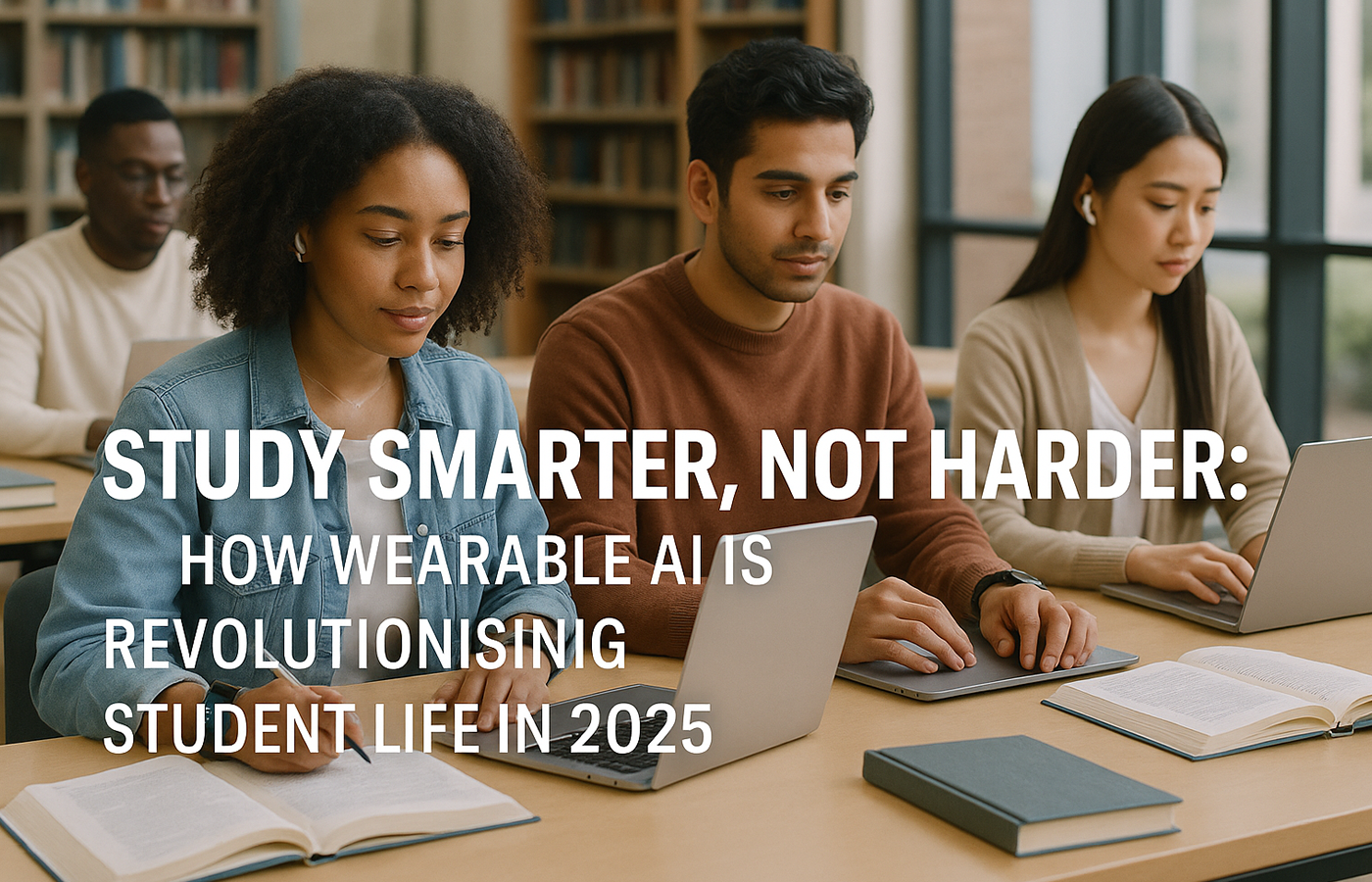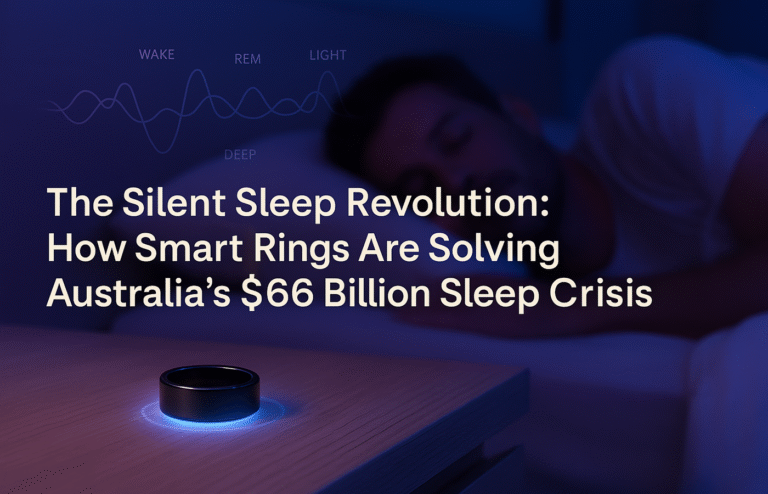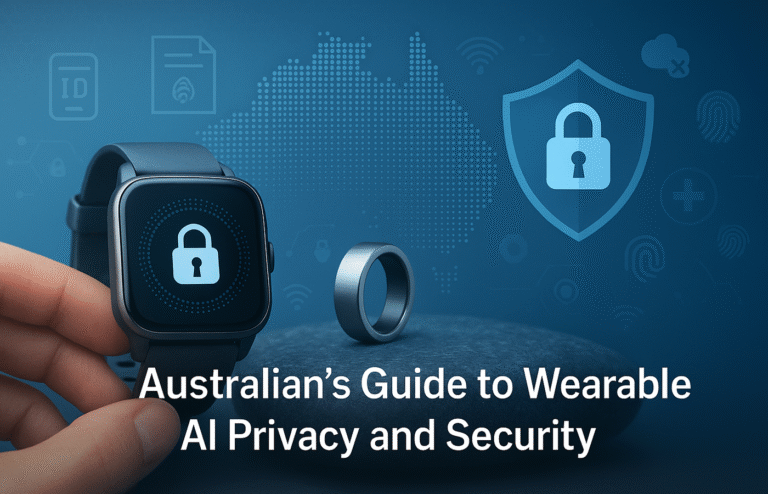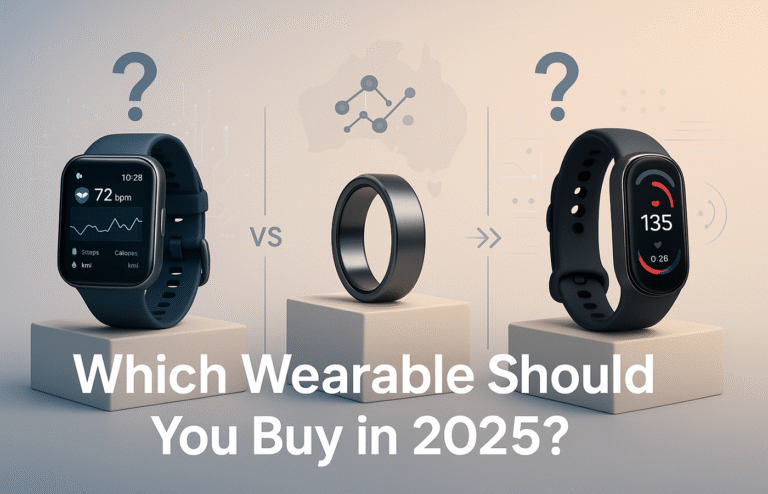Study Smarter, Not Harder: How Wearable AI is Revolutionising Student Life in 2025
Wearable AI devices are transforming Australian student life by addressing academic stress, sleep optimisation, and focus enhancement through real-time health monitoring and personalised recommendations.
Key Benefits:
● Stress monitoring through heart rate variability and EDA sensors
● Sleep analytics with smart alarms during lighter sleep phases
● Focus enhancement via adaptive noise cancellation
● Discrete health tracking for time-poor students
Budget-Friendly Options:
● Xiaomi Mi Band 8: $79 AUD (basic smart features)
● Amazfit GTS 4 Mini: $179 AUD (comprehensive tracking)
● Garmin Vivosmart 5: $219 AUD (professional design)
Premium Choices:
● Apple Watch Series 9: from $629 AUD
● Samsung Galaxy Watch6: from $549 AUD
● Oura Ring Gen3: from $469 AUD
Impact:Students using wearable technology report improved academic performance, better stress management, and enhanced quality of life through data-driven wellness insights.
Study Smarter, Not Harder: How Wearable AI is Revolutionising Student Life in 2025
Picture this: you’re cramming for final exams, surviving on instant noodles and four hours of sleep, when your smartwatch gently vibrates with a stress alert. Instead of another energy drink, it suggests a five-minute breathing exercise. Welcome to the new era of student life, where wearable AI devices are becoming your most trusted study companions.
Gone are the days when technology was merely a distraction from learning. Today’s wearable AI devices are revolutionising how Australian students approach their education, transforming everything from study habits to stress management. Whether you’re navigating Year 12 or pursuing a university degree, these intelligent devices offer practical solutions to age-old academic challenges.
The Stress-Busting Study Companion You Never Knew You Needed
Academic stress affects nearly 80% of Australian students, yet traditional stress management often feels impossible to fit into packed schedules. Fortunately, modern wearable AI devices excel at monitoring your physiological responses in real-time, providing immediate feedback when stress levels spike.
Smartwatches like the Apple Watch Series 9 (RRP from $629 AUD) now feature advanced stress monitoring through heart rate variability tracking. Similarly, the Samsung Galaxy Watch6 (RRP from $549 AUD) offers guided breathing exercises that activate automatically when elevated stress is detected. These features prove invaluable during exam periods when students often push themselves beyond healthy limits.
Moreover, many devices now incorporate mood tracking capabilities. The Fitbit Sense 2 (RRP $399 AUD) includes an EDA sensor that measures electrodermal activity – essentially detecting stress through skin conductance changes. This technology helps students recognise stress patterns and develop healthier coping mechanisms before burnout occurs.
Sleep Optimisation: The Secret Weapon for Academic Success
Quality sleep directly impacts memory consolidation, cognitive function, and academic performance. However, busy students often sacrifice sleep without realising the devastating impact on their learning capacity. Wearable AI devices tackle this challenge by providing detailed sleep analytics and personalised recommendations.
The Oura Ring Gen3 (RRP from $469 AUD) has become particularly popular among university students for its comprehensive sleep tracking. Unlike bulky devices, this discrete ring monitors sleep stages, body temperature, and recovery metrics throughout the night. Students receive daily readiness scores that help them optimise their study schedules around their natural energy cycles.
Additionally, many wearable devices now offer smart alarm features that wake users during lighter sleep phases, reducing grogginess and improving morning alertness. The Garmin Venu 3 (RRP from $649 AUD) goes further by providing personalised sleep coaching based on your lifestyle patterns and academic schedule.
Focus Enhancement: Staying Present in the Digital Age
Maintaining focus during lectures or study sessions poses significant challenges in our hyperconnected world. Thankfully, wearable AI devices offer innovative solutions for enhancing concentration and minimising distractions.
Smart earbuds like the Apple AirPods Pro 2nd Generation (RRP $399 AUD) feature adaptive transparency modes and noise cancellation that can be customised for different environments. Students can create specific audio profiles for library study sessions versus lecture halls, optimising their listening experience for maximum comprehension.
Furthermore, some devices incorporate focus-tracking features that monitor attention levels during study sessions. The upcoming Neural headband technologies, while still emerging, promise to detect when your mind wanders and provide gentle reminders to refocus. These innovations represent the cutting edge of attention-enhancing wearable technology.
Health Tracking for the Time-Poor Student
University and senior high school students often neglect their physical health whilst juggling academic demands, part-time work, and social commitments. Wearable AI devices provide effortless health monitoring that fits seamlessly into busy lifestyles.
Activity tracking has evolved beyond simple step counting. Modern devices like the Fitbit Charge 6 (RRP $329 AUD) monitor heart rate zones during study sessions, encouraging movement breaks when you’ve been sedentary too long. This feature proves particularly valuable for students spending long hours at desks or in lecture theatres.
Additionally, hydration reminders and posture alerts help maintain physical wellbeing during intensive study periods. Some advanced devices even track eye strain indicators, suggesting screen breaks before digital fatigue sets in.
Time Management and Productivity Revolution
Effective time management separates successful students from those who constantly feel overwhelmed. Wearable AI devices excel at providing discrete productivity insights without disrupting your workflow.
Calendar integration allows smartwatches to provide gentle vibrations for class transitions, assignment deadlines, and study block reminders. The ability to quickly glance at notifications without reaching for your phone reduces digital distractions whilst keeping you connected to important updates.
Moreover, many devices now offer productivity analytics that track how you spend your time across different activities. This data helps students identify time-wasting patterns and optimise their schedules for maximum efficiency.
Budget-Friendly Options for Student Wallets
Despite their advanced capabilities, wearable AI devices now come in various price ranges suitable for student budgets. The Xiaomi Mi Band 8 (RRP around $79 AUD) offers impressive health tracking and basic smart features at an extremely accessible price point.
Similarly, the Amazfit GTS 4 Mini (RRP $179 AUD) provides comprehensive fitness tracking, sleep monitoring, and smartphone connectivity without breaking the bank. These affordable options prove that students don’t need to spend hundreds of dollars to benefit from wearable AI technology.
For those seeking middle-ground options, the Garmin Vivosmart 5 (RRP $219 AUD) combines essential health tracking with smart notifications in a sleek, professional design suitable for both campus and workplace environments.
Campus Integration and Digital Connectivity
Australian universities increasingly embrace digital integration, and wearable devices facilitate seamless connectivity with campus systems. Many devices can store student ID credentials, enabling contactless access to libraries, labs, and residential facilities.
Furthermore, some universities pilot programs incorporating wearable data into wellness initiatives. Students can participate in campus-wide fitness challenges or receive personalised health recommendations through their student portal, creating a more connected and supportive educational environment.
Privacy Considerations for Student Data
Whilst wearable AI devices offer tremendous benefits, students must carefully consider privacy implications. Educational institutions and device manufacturers handle sensitive health and behaviour data that requires protection.
Most reputable manufacturers implement robust encryption and provide granular privacy controls. However, students should review data sharing policies carefully, particularly regarding academic institutions’ access to personal health information. Choosing devices with strong privacy credentials and understanding your rights ensures you can enjoy the benefits whilst protecting your personal data.
The Smart Investment in Your Academic Future
Wearable AI devices represent more than technological novelties – they’re strategic investments in academic success and long-term wellbeing. By providing real-time insights into stress levels, sleep quality, focus patterns, and physical health, these devices help students develop sustainable habits that extend far beyond graduation.
The evidence is clear: students who actively monitor and manage their wellbeing through wearable technology report improved academic performance, better stress management, and enhanced overall quality of life. As these devices become more sophisticated and affordable, they’re transitioning from luxury items to essential academic tools.
Whether you’re preparing for HSC exams or pursuing postgraduate studies, wearable AI devices offer practical solutions to common student challenges. The key lies in choosing devices that align with your specific needs, budget, and lifestyle whilst maintaining awareness of privacy considerations.
The future of education isn’t just about smarter textbooks or online learning platforms – it’s about empowering students with personalised insights that help them optimise their learning potential. Wearable AI devices are leading this transformation, one student at a time.








